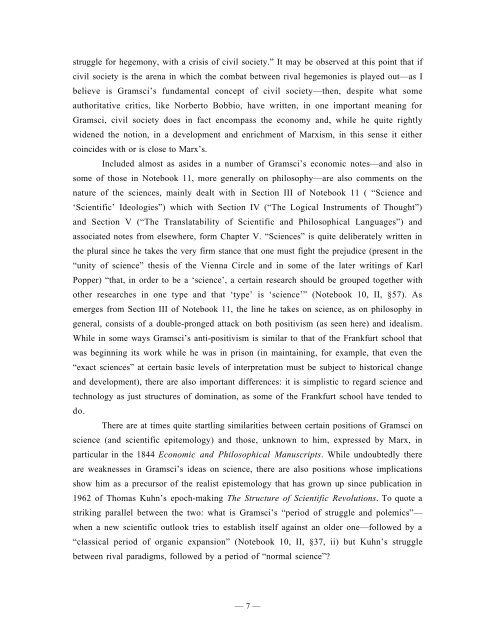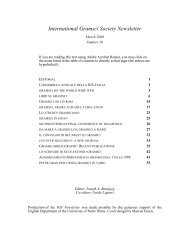Newsletter - International Gramsci Society
Newsletter - International Gramsci Society
Newsletter - International Gramsci Society
You also want an ePaper? Increase the reach of your titles
YUMPU automatically turns print PDFs into web optimized ePapers that Google loves.
struggle for hegemony, with a crisis of civil society.” It may be observed at this point that if<br />
civil society is the arena in which the combat between rival hegemonies is played out—as I<br />
believe is <strong>Gramsci</strong>’s fundamental concept of civil society—then, despite what some<br />
authoritative critics, like Norberto Bobbio, have written, in one important meaning for<br />
<strong>Gramsci</strong>, civil society does in fact encompass the economy and, while he quite rightly<br />
widened the notion, in a development and enrichment of Marxism, in this sense it either<br />
coincides with or is close to Marx’s.<br />
Included almost as asides in a number of <strong>Gramsci</strong>’s economic notes—and also in<br />
some of those in Notebook 11, more generally on philosophy—are also comments on the<br />
nature of the sciences, mainly dealt with in Section III of Notebook 11 ( “Science and<br />
‘Scientific’ Ideologies”) which with Section IV (“The Logical Instruments of Thought”)<br />
and Section V (“The Translatability of Scientific and Philosophical Languages”) and<br />
associated notes from elsewhere, form Chapter V. “Sciences” is quite deliberately written in<br />
the plural since he takes the very firm stance that one must fight the prejudice (present in the<br />
“unity of science” thesis of the Vienna Circle and in some of the later writings of Karl<br />
Popper) “that, in order to be a ‘science’, a certain research should be grouped together with<br />
other researches in one type and that ‘type’ is ‘science’” (Notebook 10, II, §57). As<br />
emerges from Section III of Notebook 11, the line he takes on science, as on philosophy in<br />
general, consists of a double-pronged attack on both positivism (as seen here) and idealism.<br />
While in some ways <strong>Gramsci</strong>’s anti-positivism is similar to that of the Frankfurt school that<br />
was beginning its work while he was in prison (in maintaining, for example, that even the<br />
“exact sciences” at certain basic levels of interpretation must be subject to historical change<br />
and development), there are also important differences: it is simplistic to regard science and<br />
technology as just structures of domination, as some of the Frankfurt school have tended to<br />
do.<br />
There are at times quite startling similarities between certain positions of <strong>Gramsci</strong> on<br />
science (and scientific epitemology) and those, unknown to him, expressed by Marx, in<br />
particular in the 1844 Economic and Philosophical Manuscripts. While undoubtedly there<br />
are weaknesses in <strong>Gramsci</strong>’s ideas on science, there are also positions whose implications<br />
show him as a precursor of the realist epistemology that has grown up since publication in<br />
1962 of Thomas Kuhn’s epoch-making The Structure of Scientific Revolutions. To quote a<br />
striking parallel between the two: what is <strong>Gramsci</strong>’s “period of struggle and polemics”—<br />
when a new scientific outlook tries to establish itself against an older one—followed by a<br />
“classical period of organic expansion” (Notebook 10, II, §37, ii) but Kuhn’s struggle<br />
between rival paradigms, followed by a period of “normal science”?<br />
— 7 —



